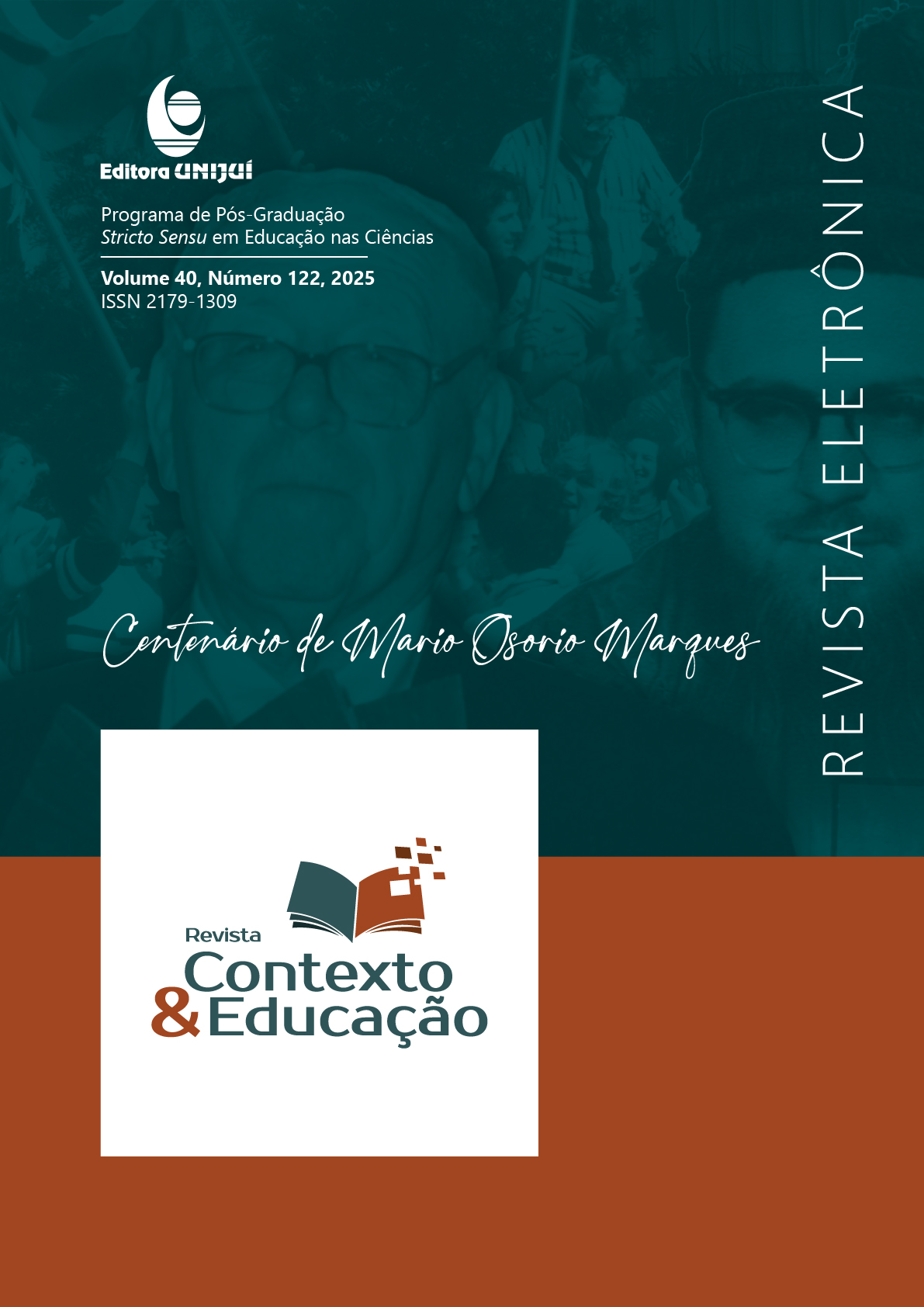Mario Osorio Marques: um profanador dos pedagogismos da morte
DOI:
https://doi.org/10.21527/2179-1309.2025.122.17205Palavras-chave:
Universidade, Formação Humana, Mario Osorio MarquesResumo
O artigo reflete acerca das contribuições do humanista Mario Osorio Marques no contexto da educação. Trata-se de um pensador original e ainda pouco conhecido na academia, cuja tematização a respeito de sua vida é feita com base na experiência de convívio de um de seus ex-alunos, em consulta a suas obras e em outros aportes teóricos, resultando em pesquisa bibliográfica, de caráter qualitativo e poético. Sua postura epistêmica de pensar os problemas educacionais, o fez romper fronteiras geográficas, dentre seus feitos está a criação da FAFI (Faculdade de Filosofia, Ciências e Letras) no ano de 1957, hoje Universidade Regional do Noroeste do Estado do Rio Grande do Sul – UNIJUÍ e, mais tarde, foi idealizador na abertura do Programa de Pós-Graduação em Ciências da Educação – PPGEC/Unijuí. Mario Osorio compreendeu como poucos a importância da Universidade como ambiente de formação e constituição de humanidades, valendo-se de pilares como a pesquisa, a leitura e a escrita. Mais que uma ação de aprender, a leitura e a escrita, para ele, são atos de resistência. Ele deixou muito mais que um legado vivo de compreensão de Universidade e de formação profana que não se entrega ao empobrecimento imposto pela lógica racional, fragmentária e transmissiva, à qual fomos e continuamos expostos. Ele deixou o exemplo de persistência epistemológica, demonstrando que ler, escrever e conhecer são pilares de emancipação humana, produtores de mundo, geradores de consciência e energia viva que nos impelem e desafiam a sermos humanos demasiado humanos em nossa intempestividade ético - formativa.
Referências
AGAMBEN, G. Profanações. São Paulo: Boitempo, 2007.
BERMAN, Marshall. 10ª reimpressão. Tudo o que é sólido desmancha no ar: a aventura da modernidade. São Paulo: Companhia das Letras, 1986.
DALBOSCO, Claudio A.; FLICKINGER, Hans-Georg Diálogo entre Hans-Georg Flickinger e Claudio A. Dalbosco: traços de uma viagem hermenêutico-formadora. In: DALBOSCO, Claudio A. [et al.] (Org.). Universidade formadora: Festschrift a Hans-Georg Flickinger. Passo Fundo: EDIUPF; Porto Alegre: Editora Fundação Fênix, 2024. p. 12-40
FOUCAULT, Michel. A vida dos homens infames. In: Estratégia, poder-saber. Ditos e escritos IV. Rio de Janeiro: Forense Universitária, 2003, p.203-222.
GUITTON, Jean. O trabalho intelectual: conselhos para os que estudam e para os que escrevem Campinas, SP: CEDET, 2018.
LAFUENTE, Antonio. Educação: a aposta radical do oficinar. Publicado por Outras Palavras em 10-12-2020. Disponível em https://www.ihu.unisinos.br/categorias/605489-educacao-a-aposta-radical-do-oficinar. Acesso em: 12/12/2024.
MARQUES, Mario Osorio. Universidade emergente: o ensino superior brasileiro em Ijuí. Ijuí: Ed. UNIJUÍ, 1984. Revista pedagógica, v.18, n.37, jan./abr. 2016.
MARQUES, Mario Osorio. Conhecimento e educação. Ijuí: Ed. UNIJUÍ, 1988.
MARQUES, Mario Osorio. Pedagogia: a ciência do educador. Ijuí: Ed. UNIJUÍ, 1990 (2002).
MARQUES, Mario Osorio. A formação do profissional da educação. Ijuí: Ed. UNIJUÍ, 1992.
MARQUES, Mario Osorio. Os paradigmas da educação. Revista Brasileira de Estudos Pedagógicos, Brasília: MEC-INEP, v. 73, n. 175, p. 547-565, set./dez. 1992a. Disponível em: http://rbep.inep.gov.br/index.php/RBEP/article/view- File/389/394. Acesso em: 1º dez. 2015.
MARQUES, Mario Osorio. Conhecimento e modernidade em reconstrução. Ijuí: Ed. UNIJUÍ, 1993.
MARQUES, Mario Osorio. A aprendizagem na mediação social do aprendido e da docência. Ijuí: Ed. UNIJUÍ, 1995.
MARQUES, Mario Osorio. Educação/interlocução, aprendizagem/ reconstrução de saberes. Ijuí: Ed. UNIJUÍ, 1996.
MARQUES, Mario Osorio. Escrever é preciso: o princípio da pesquisa. Ijuí: Ed. UNIJUÍ, 1997 (2003).
MARQUES, Mario Osorio. A escola no computador: linguagens articuladas, educação outra. Ijuí: Ed. UNIJUÍ, 1999.
MARQUES, Mario Osorio. Educação nas ciências: interlocução e complementaridade. Ijuí: Ed. UNIJUÍ, 2002.
MARQUES, Mario Osorio. O educador/pedagogo na relação educativa direta. Contexto e educação, Ijuí, Livraria Unijuí editora, v. 1, n. 1, jan./mar. 1990. p. 17-30
MATURANA, Humberto. Ontologia da realidade. Belo Horizonte: Editora da UFMG, 2014.
MATURANA, H.; VARELA, F. De máquinas e seres vivos: Autopoiese: a organização do vivo. 3. ed. Porto Alegre: Artes Médicas, 1997.
MATURANA, Humberto; REZEPKA, Sima N. de. Formação humana e capacitação. Petrópolis, RJ: Vozes, 2003.
MATURANA, Humberto; VARELA, Francisco. A árvore do conhecimento: as bases biológicas da compreensão humana. Campinas/São Paulo: Editora Psy II, 1995.
MORIN, Edgar. Conhecimento, ignorância, mistério. Rio de Janeiro: Bertrand Russel, 2020.
TREVISAN, Amarildo Luiz. O último refúgio da palavra: o desafio de escrever como gente. Escrever com alma, sentimento... “é mais do que desafio. É ato de resistência”. Claudemir Pereira [online], 08 fev. 2025.
Downloads
Publicado
Como Citar
Edição
Seção
Licença
Copyright (c) 2025 Revista Contexto & Educação

Este trabalho está licenciado sob uma licença Creative Commons Attribution 4.0 International License.
Ao publicar na Revista Contexto & Educação, os autores concordam com os seguintes termos:
Os trabalhos seguem a licença Creative Commons Atribuição 4.0 Internacional (CC BY 4.0), que permite:
Compartilhar — copiar e redistribuir o material em qualquer meio ou formato;
Adaptar — remixar, transformar e criar a partir do material para qualquer fim, inclusive comercial.
Essas permissões são irrevogáveis, desde que respeitados os seguintes termos:
Atribuição — os autores devem ser devidamente creditados, com link para a licença e indicação de eventuais alterações realizadas.
Sem restrições adicionais — não podem ser aplicadas condições legais ou tecnológicas que restrinjam o uso permitido pela licença.
Avisos:
A licença não se aplica a elementos em domínio público ou cobertos por exceções legais.
A licença não garante todos os direitos necessários para usos específicos (ex.: direitos de imagem, privacidade ou morais).
A revista não se responsabiliza pelas opiniões expressas nos artigos, que são de exclusiva responsabilidade dos autores. O Editor, com o apoio do Comitê Editorial, reserva-se o direito de sugerir ou solicitar modificações quando necessário.
Somente serão aceitos artigos científicos originais, com resultados de pesquisas de interesse que não tenham sido publicados nem submetidos simultaneamente a outro periódico com o mesmo objetivo.
A menção a marcas comerciais ou produtos específicos destina-se apenas à identificação, sem qualquer vínculo promocional por parte dos autores ou da revista.
Contrato de Licença (para artigos publicados a partir de outubro/2025): Os autores mantém os direitos autorais sobre seu artigo, e concedem a Revista Contexto & Educação o direito de primeira publicação.


